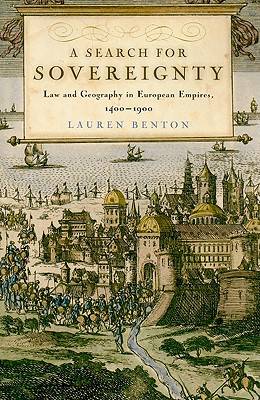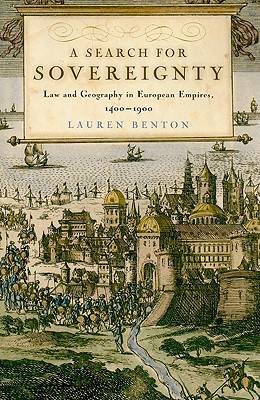
Door een staking bij bpost kan je online bestelling op dit moment iets langer onderweg zijn dan voorzien. Dringend iets nodig? Onze winkels ontvangen jou met open armen!
- Afhalen na 1 uur in een winkel met voorraad
- Gratis thuislevering in België vanaf € 30
- Ruim aanbod met 7 miljoen producten
Door een staking bij bpost kan je online bestelling op dit moment iets langer onderweg zijn dan voorzien. Dringend iets nodig? Onze winkels ontvangen jou met open armen!
- Afhalen na 1 uur in een winkel met voorraad
- Gratis thuislevering in België vanaf € 30
- Ruim aanbod met 7 miljoen producten
Zoeken
A Search for Sovereignty
Law and Geography in European Empires, 1400-1900
Lauren Benton
Paperback | Engels
€ 48,95
+ 97 punten
Uitvoering
Omschrijving
A Search for Sovereignty maps a new approach to world history by examining the relation of law and geography in European empires between 1400 and 1900. Lauren Benton argues that Europeans imagined imperial space as networks of corridors and enclaves, and that they constructed sovereignty in ways that merged ideas about geography and law. Conflicts over treason, piracy, convict transportation, martial law, and crime created irregular spaces of law, while also attaching legal meanings to familiar geographic categories such as rivers, oceans, islands, and mountains. The resulting legal and spatial anomalies influenced debates about imperial constitutions and international law both in the colonies and at home. This original study changes our understanding of empire and its legacies and opens new perspectives on the global history of law.
Specificaties
Betrokkenen
- Auteur(s):
- Uitgeverij:
Inhoud
- Aantal bladzijden:
- 358
- Taal:
- Engels
Eigenschappen
- Productcode (EAN):
- 9780521707435
- Verschijningsdatum:
- 30/11/2009
- Uitvoering:
- Paperback
- Formaat:
- Trade paperback (VS)
- Afmetingen:
- 152 mm x 229 mm
- Gewicht:
- 521 g

Alleen bij Standaard Boekhandel
+ 97 punten op je klantenkaart van Standaard Boekhandel
Beoordelingen
We publiceren alleen reviews die voldoen aan de voorwaarden voor reviews. Bekijk onze voorwaarden voor reviews.











